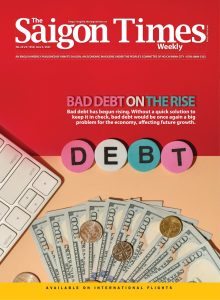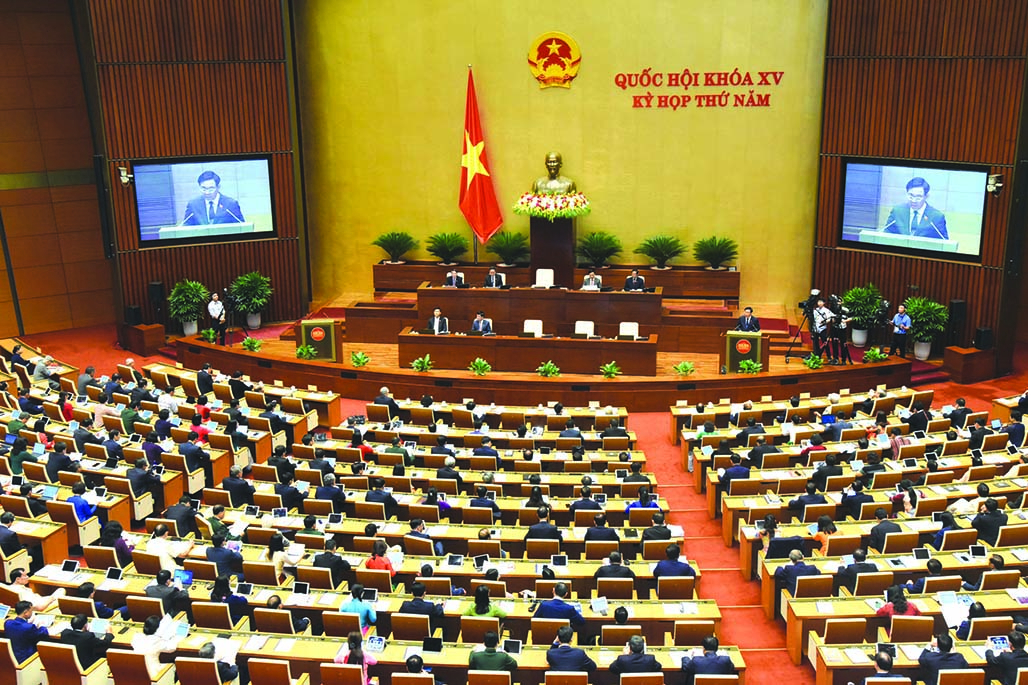The National Assembly (NA) sitting is taking place at a time when things could not be worse. The country has been beset by economic woes while business sentiment has plunged to its lowest since 2005.
The 15th NA began its fifth sitting in Hanoi on May 22. During the ongoing meeting, there have been two major changes so far, which are expected to promote reform and strengthen the NA’s operational capacity.
To begin with, the 23-day meeting was divided into two halves, one from May 22 to June 10 and the other from June 19 to 23. In the in-between week, legislators will “discuss and give feedback on the draft laws and resolutions that will have been proposed during the first half, paving the way for the relevant documents to be presented for NA approvals when the sitting comes to a close,” said NA Chairman Vuong Dinh Hue. The initiative was sought to relieve time pressure facing the NA agencies and enhance the effectiveness of lawmaking.
In addition, the NA planned to work on a report on supervision results of the settlement of voters’ petitions, which had been sent to legislators during the previous sitting. As for this change, the NA wants to boost its role in terms of representation and oversight, thus improving the credibility of Vietnam’s highest representative body in the eyes of the public.
Nevertheless, as protracted global challenges have put the economy in a bind, market frustrations spilled over the inauguration of the fifth sitting. Despite the reopening in March last year, Vietnam’s gross domestic product in the first quarter of 2023 edged up by a mere 3.32% year-on-year, with contraction being found across the country’s growth driving factors, including export, investment and manufacturing.
Between January and April, Vietnam’s index of industrial production inched down by 1.8% against the same period last year, with the processing and manufacturing sectors declining by 2.1%. The US$107.16-billion export revenue recorded in the first four months was 13% lower than in the year-ago period, which in part led to a 15.3% reduction of foreign trade in the year to April, estimated at US$206.76 billion.
As for investments, the capital inflows of the non-State sector in the first quarter of 2023 picked up 1.8%. But that was all: Freshly pledged foreign capital plunged by 17.9% during the period, while disbursed capital slid by 1.2%.
Public investment performance, which was envisioned to stimulate the economic recovery this year, has yet to meet expectations so far. The capital disbursement rate remains sluggish, reaching roughly 14.66% of the full-year plan and 15.65% of the target previously set by Prime Minister Pham Minh Chinh.
Vietnam’s business community has been hit hard by headwinds at home and abroad. According to the NA Economic Committee, many owners have been left with little choice but to sell their businesses to deal with heightened pressure of bank loan maturity. To local managers elsewhere, a shortage of fresh orders has caused lingering headaches in operations, forcing many employees to leave, and making life difficult for many others.
The number of newly-established and re-operational enterprises in Q1 slid 2% over 2022. The number of businesses that temporarily suspended their operations even surged by 21.8%, with those halting operations pending dissolution and completing procedures for disbandment soaring by 39.9% and 10.1%, respectively. Every month, some 19,700 companies enter the market, but there are also 19,200 firms forced to leave the market.
The predicament of the domestic economy has been noticed in the eyes of local manufacturers. According to a report by the Vietnam Chamber of Commerce and Industry (VCCI) in 2022, only 35% of private companies and 33% of foreign-invested firms planned to scale up business within the next two years, the lowest points recorded ever in the annual survey of VCCI over the last 18 years. Simply put, the number speaks for itself.
On the sidelines of the NA discussions, concerns have been raised among legislators over a bumpy road ahead. The 6.5%-growth-rate target appears to be a nerve-racking task given a range of protracted global distresses, including recession fears and geopolitical tensions.
As stated by Phan Duc Hieu, permanent member of the NA Economic Committee, Vietnam’s socioeconomic performance this year, albeit modest, has stood out as a beacon of hope as many countries have tumbled in times of uncertainty. But the current state of the economy looks like “a paddy field in bloom, with storm clouds hanging overhead”.

In addition to global challenges, the committee noted that a variety of internal obstacles that have yet to be eliminated properly is now holding the country’s growth back. To a certain extent, the predicament of domestic manufacturing has been attributed to poor management and coordination among the relevant agencies. Meanwhile, the provincial administrations have faced difficulties in the policy implementation stage as there are certain officials who take the charge but always try to pass the buck to others.
Hence, the NA has planned to set up favorable schemes to support local businesses and provide momentum for recovery, namely approving a 2% reduction in the value-added tax (VAT) on goods and services subject to a 10% VAT and extending the e-visa validity to 90 days with single or multiple entries for foreigners. Moreover, the NA will work on the task assignment with capital allocation for projects under the Socioeconomic Development and Recovery Program, in addition to considering a resolution on piloting specific mechanisms for HCMC to create breakthroughs in the city’s development.
In the words of Chairman Vuong Dinh Hue, the NA called for effective discussions with viable suggestions among legislators, with the goals of fostering administrative reform, enhancing the business environment and improving the responsibility of the officials on duty.
As part of globalization, geopolitical upheavals and market volatility inevitably become external forces that could hinder Vietnam’s economic revival post pandemic. Looking inwards, however, it is up to the Government and relevant authorities to cut red tape and improve the economic climate for business expansion. More significantly, Vietnam should seize every opportunity for progress to weather the storm and enjoy the rewards of the blossoming paddy field of prosperity. With its crucial role in exercising constitutional and legislative powers, the NA has been put in the right place to push the relevant agencies to navigate the multitude of shocks facing the economy.









